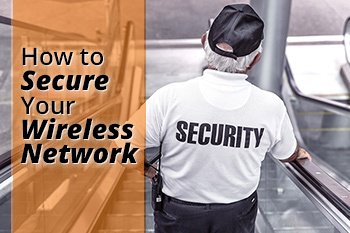 Did you know that if an infected computer connects to your wireless network, it could put the other devices on your network at risk?
Did you know that if an infected computer connects to your wireless network, it could put the other devices on your network at risk?
Not only that, malicious parties can always launch attacks over the internet using your originating IP address. Do you know what’s currently being sent out over the internet through your wireless router?
It’s important to implement security measures that ensure the utmost safety for your WiFi networks. Hackers are more sophisticated than ever in their efforts to steal information being broadcast over wireless networks. Therefore, it’s imperative that you take proper precautions in order to secure your wireless networks from those with malicious intent.
Firewalls: The First Line of Defense
Firewalls help filter out malicious connections from the internet into your desktop PC. If your personal firewall detects an unusual request or transmission of data, a firewall may intercept that request and double-check with the user to ensure that the connection is authorized.
Firewalls don’t exist at the software level only; firewalls can be implemented as an appliance that sits between your wireless router and the outside internet connection.
If you set up a hardware based firewall to monitor the traffic traversing throughout your wireless network, you can stop attacks before they start by using advanced settings found in your firewall appliance. Many firewall appliances have built in features that filter data being sent from malicious code such as botnets, malware and viruses.
Enforce Virus Scanning on Your WiFi Network
You should always enforce virus scanning on your network. Some WiFi suites only allow guests to connect if their machine passes an internal check before completing the connection. This test checks for the presence of a trusted virus scanning client on the machine.
If unwelcome software does find its way onto a computer, virus scanners and anti-malware programs are the best defense a PC has against these attacks. Considering most notable virus scanners will update their definition files daily, users can feel safe knowing that they are protected from latest threats.
If cost is a concern, several reputable virus scanners (like ESET Endpoint Security) will allow you to download a free trial. This will let you test the product and make sure it meets your company’s needs before committing to the purchase.
Further Steps for Protection
If an organization wants more security than the usual methods of firewalls and antivirus software, there are several options available.
While these options may require extensive research and planning, advanced methods of wireless network security can be achieved with time, money, and effort.
Best practices for securing your wireless network include turning off remote access and port forwarding on your wireless endpoints. You could also begin maintaining a MAC address whitelist and only allow DHCP to issue an IP address to trusted devices.
In this scenario, each device would need to be registered onto your network. Some software suites offer a portal while other organizations ask their IT team to facilitate the process of granting access.
Closing Thoughts on Wireless Network Security
You should be using long, unique and complex passwords to secure your wireless networks with a minimum of WPA2 encryption. You should frequently change your wireless network passwords as this will discourage users from sharing passwords.
If password sharing is a concern, two factor authentication could be implemented as a requirement for wireless network access. Some organizations neglect to broadcast their SID, in order to provide security by obscurity.
While it’s impossible to prevent every attack being perpetrated, a wireless network’s security can be hardened with a clear vision and a little research. With time, energy and a strategy for implementation, your organization can achieve a level of wireless network security that far exceeds industry best practices. If you’re in the Greenville, SC or Atlanta, GA area and need help building and implementing a strategy, give us a call at (833) 482-6435 or contact us online for a network assessment — we’d love to help you out!
If you enjoyed this IT Support article, please check out other posts on our blog and join us on Facebook, Twitter, LinkedIn, and Google+ to see how else we can help your Greenville, SC or Atlanta, GA area business succeed!

